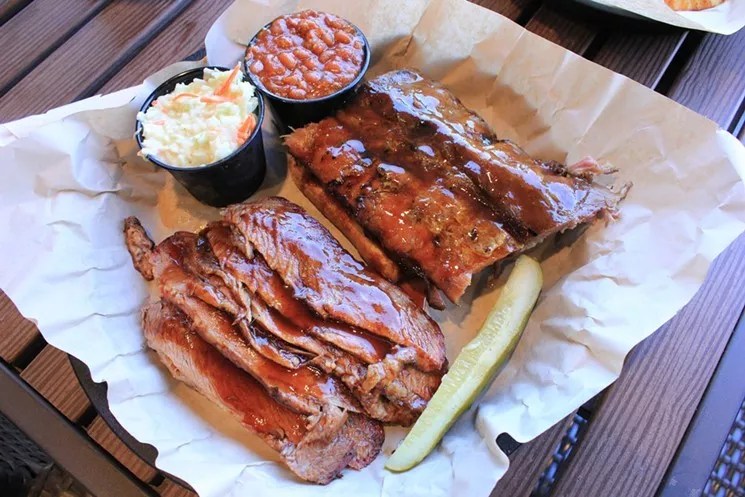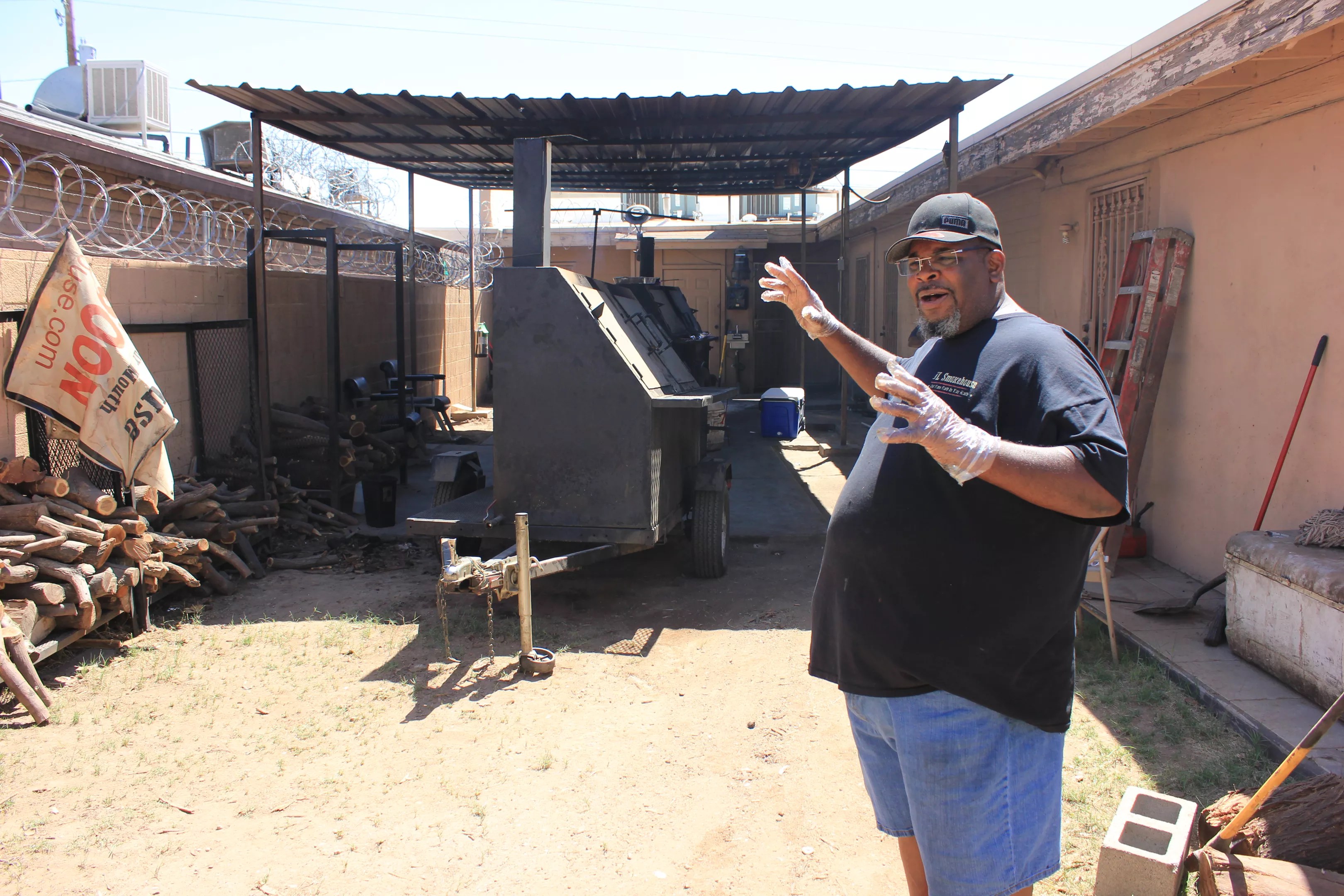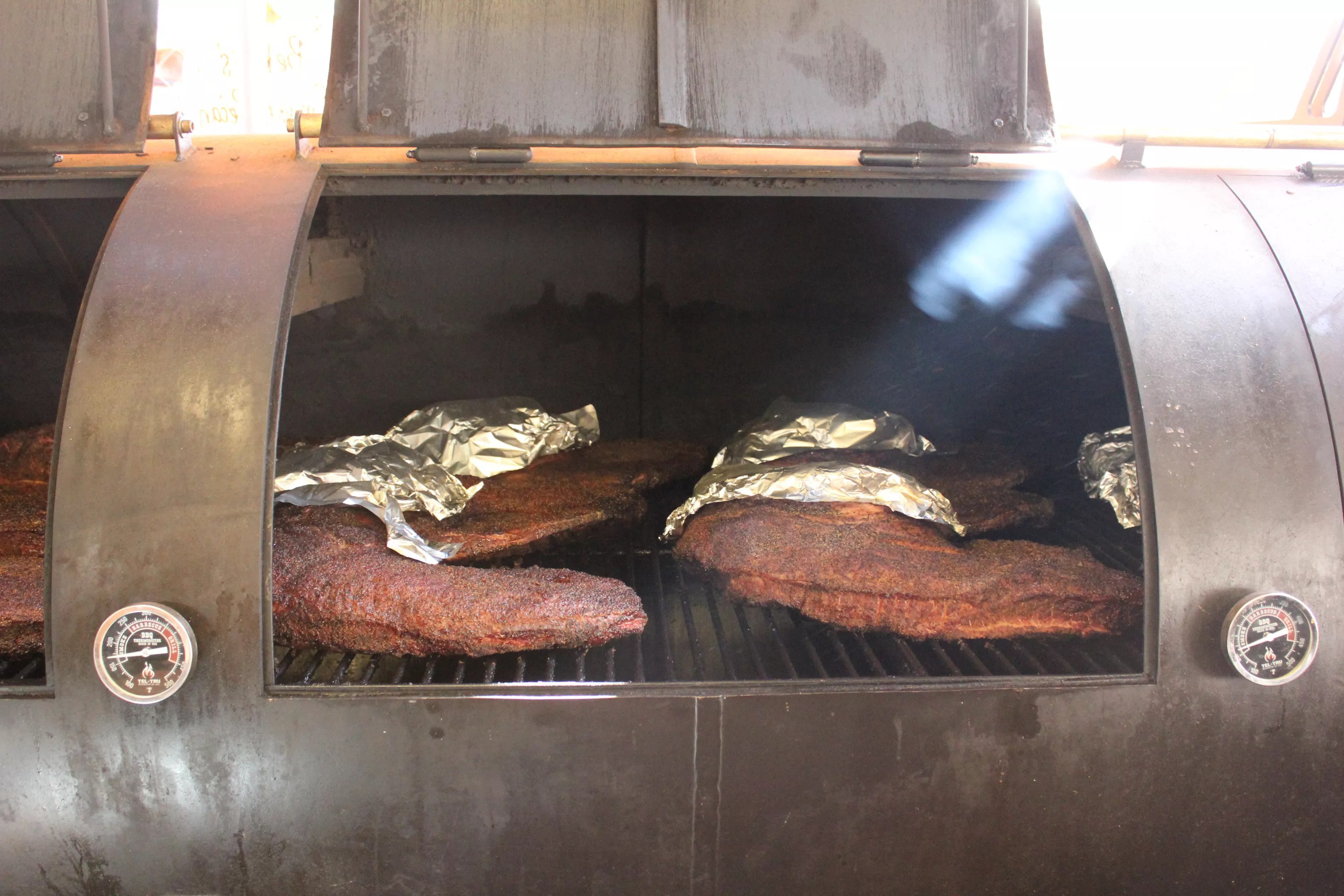
Chris Malloy

Audio By Carbonatix
After long honing his brisket method, Eric Tanori opened Eric’s Family Barbecue in Avondale early this year. Brisket quickly became his bestseller. It is, he says, “what we’re most proud of,” but now, two months into the pandemic, Tanori hopes to sell less.
If new trends continue, he says, “We’re ready to dethrone brisket as king of the restaurant.”
Recently, local barbecue restaurants have started to feel the financial squeeze of meat supply chain disruptions caused by the pandemic. At the meatpacking level, there have been issues, chiefly the rapid spread of coronavirus through the giant plants that process more than 75 percent of American meat. Many big meatpacking plants have closed or slowed, leaving a glut of on-farm pigs, and chicken ready for slaughter, with nowhere to go.

An offset smoker from Eric’s Family Barbecue in Avondale.
Chris Malloy
With meat plants reeling, supply and price irregularities have started to ripple out to local eateries. None are more dependent on meat prices than barbecue joints. These changes have made business, already slowed by the current situation, even more challenging.
“We’ve seen a 50 to 60 percent price increase on the brisket in three weeks,” Tanori says. “On the pork, we’ve seen slight increases, but nothing like the brisket.”
Tanori has also seen shortages. Three weeks ago, he had a hard time finding pork ribs and pork butt. More recently, brisket has been in short supply, but luckily, Tanori says, a new local meat supplier, Off the Hook in Litchfield Park, “saved our asses this last week and a half.”
But even with fewer customers, securing meat has been tough.
“For the past two weeks, we’ve been scrambling to get briskets on the smoker,” he says. “We’re exhausting every source we can.”
Tanori doesn’t know what to do. He doesn’t want to “double prices on people.” Whatever action he takes, he won’t be making much money on brisket – so he wants to sell more pork, so much so that he is developing a new pork sausage.

James Lewis of JL Smokehouse philosophizing about wood and smoke.
Chris Malloy
Older barbecue hands are grappling with similar new problems.
“Prices have gone up on all of the meats,” says James Lewis of JL Smokehouse. “You started seeing it crawling up two or three weeks ago. You started seeing the rib prices going up, and the pork prices as well.” Lewis also describes price gaps. “I’m going to one place and getting a good price, and then I go to another and I see the price to the sky.”
Therefore, Lewis has started to get creative. “You got to find ways,” he says. “Brisket is what makes the day. But at the same time, it isn’t what makes the bank.” So he’s promoting ribs. And he’s smoking brisket at lower temperatures (in other times, he started meat high and then finished them slow and low) so he loses less weight to drippings.
Oren Hartman of NakedQ BBQ is taking another approach – keeping his methods constant, but expanding his options to create more buying opportunity. In recent weeks, he says, “I went from two suppliers for my protein to four different sources.” The other day, two of his suppliers were completely out of prime rib. Knowing price hikes were coming, Hartman recently bought up a bunch of brisket in advance – a tactical move, but one that can’t be repeated once prices have settled into the sky.

Briskets in the smoker at Little Miss BBQ.
Chris Malloy
Hartman says the challenge of rising prices is steepened by others: slow business, higher labor costs, and the expense of more hand sanitizer, individually wrapped utensils, and other safety precautions.
“If you had a really strong business before, you can do it,” he says. “But if you didn’t, you can’t.”
On Sunday, Trapp Haus BBQ, run by Phil Johnson, posted a supply warning to Instagram. “Due to a shortage in certain meat products the Trapp Haus has a limited supply of brisket,” it reads. “We are working with suppliers to ensure that we procure quality brisket for you as soon as possible.”
Over at Little Miss BBQ, Scott Holmes traces some of the problem to supply chain imbalances. Because farmers are desperate to sell animals stuck on farms, packers have seized the chance to pay farmers less. Holmes says his rancher is now losing $300 per head of cattle.
Holmes has seen his pork prices rise, pinching his margins on his more profitable proteins. He, Hartman, and Lewis have seen their brisket prices roughly double. Holmes says his cost to cook brisket is $18.25 a pound, not even counting seasoning, wood, fire, or labor. Brisket, his crowd-drawing meat, doesn’t make much money in the best of times.

Oren Molovinksy smoking an Arizona half-hog.
Chris Malloy
These price and supply trends have a chasm. One barbecue eatery gets its meat from small ranches in Arizona. Other barbecue operators source meat from afar, for price and consistency purposes, but Oren Molovinsky of Farmboy Market, Meats, Sandwiches sources beef through Arizona Grass Raised Beef and pork through Wilson Farms in the west Valley. These much smaller meat operations exist beyond the large-scale farms and plants crippled by coronavirus. Molovinksy’s meat supply chain has barely budged. “We did see a small price increase on beef,” he says, “but it was inconsequential for us.”
None of the operators facing higher meat prices want to raise theirs. To some degree, all are still wondering how to proceed. Ideally, this price spike, like the pandemic, will pass swiftly. But that will depend on government action, and if big meatpacking plants can adapt.
“I don’t think it’s going to last that long,” Hartman says. “I see this lasting a few weeks. I would expect that by the end of the month, we’ll see a little more normalcy in the market and then we’ll go from there.”